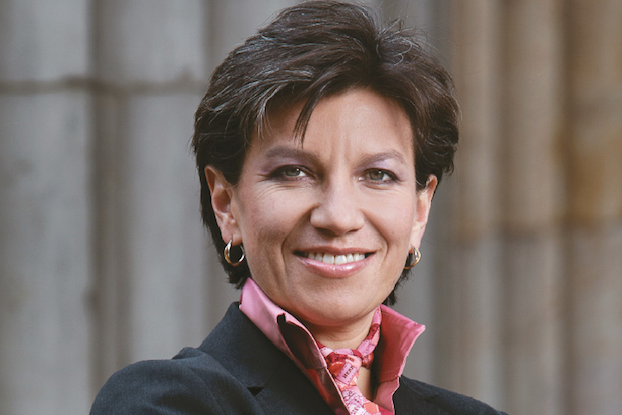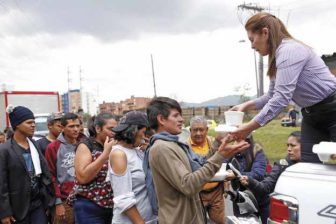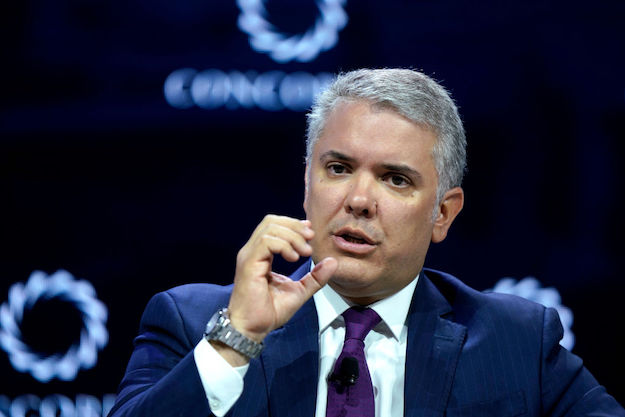Claudia López isn’t one to be shy. In 20 years of public life – as a student leader, a journalist, and now as senator for Colombia’s Green Party – the 47-year-old has earned a reputation for speaking her mind, particularly when it comes to corruption in politics.
Now a candidate for presidential elections in 2018, López is banking on public anger over recent graft scandals – and her straight-talking appeal – to win over supporters. So far, it seems to be working: A recent Invamer poll put her third in a field of more than a dozen potential candidates, behind only former Medellín Mayor Sergio Fajardo and former Vice President Germán Vargas Lleras. And on Sept. 18, López confirmed her participation in a center-left coalition that includes Fajardo – meaning that, even if she doesn’t end up on the final ballot, López will have an important role to play in 2018.
López spoke to AQ about her presidential platform and how she views the coming 2018 race. This interview has been translated from Spanish, and edited for clarity and length.
When did corruption become such an urgent issue in Colombia?
This isn’t a new problem that simply emerged all of a sudden. Cronyism, corruption and political patronage have been the way to govern Colombia for years, but they weren’t on the mainstream because of the armed conflict. The country’s predatory political class has often used this excuse: “We might be thugs, but the guerrillas are worse.”
There’s a lot of anti-establishment feeling in the country right now. Does that carry any risks?
Yes, there are these feelings. But behind them, there’s people being fed up with corruption – regardless of its origin, old establishment or new establishment. Traditional political elites like Vargas Lleras or (President Juan Manuel) Santos are touched by corruption. And in turn, the new elites that see themselves as anti-establishment, like former President Álvaro Uribe, are also corrupt. They might differ in facing how to implement peace, but they are really quite the same. Both (former presidential candidate) Iván Zuluaga and Santos received Odebrecht money. They both buy congressmen and steal money from contracts in order to buy political support.
You have said that your coalition is “center-left, but more center than left.” What does that mean?
The Colombian elite pulls this trick often: delegitimization of any questioning from the left by linking it to the guerrillas. That’s why I say that we don’t belong to any radical position, neither on the right nor on the left. … We see that the way forward for Colombia is a solid market economy and a progressive tax system that enable quality public investment.
How have other societies recovered from dictatorships or civil wars? It turns out they have always made it through with ample coalitions, independent sectors, coming from the center-left. Successful transitions have never occurred from the most radical left-wing ideology, but from the centrist, most moderate one.
Last year’s referendum on the peace accord, which was narrowly defeated, showed that former President Álvaro Uribe continues to have a lot of influence in Colombian politics.
We shall see, we shall see. For the first time, views of Uribe are more negative than positive. He does still have a strong political endorsement capacity, which is hard to achieve. But 2018 won’t be another plebiscite. These elections will be about who will defeat corruption and who won’t. It’ll be about whether the middle class can rebel against Uribismo and Santismo.
These elections will also be the first presidential race after the peace process with the FARC. Who benefits from this?
This factor will benefit the majorities that wanted to get rid of the FARC. The FARC are an anvil keeping us from progress, they were the big excuse that captured all the attention. The FARC not only kidnapped 35,000 Colombians, they also kidnapped the country’s politics. In the past 20 years the presidency was defined by what to do or what not to do about the FARC. Now, this won’t be the main question in the campaign.
How well positioned is the new FARC political party facing the 2018 elections?
They don’t have the slightest chance in the short term. It will take them even longer to succeed than other demobilized organizations in the past. FARC is the seventh guerrilla group to demobilize in Colombia. The first one demobilized in 1989. And none of the leaders of the demobilized guerrillas has had a chance of winning the presidency, by a long shot. … What’s more, those guerrillas had a halo of romanticism. The FARC lost that halo years ago. They were the last to demobilize, and did so only after a process of degradation, violent criminalization and a really extensive relationship with narcotrafficking.
What is your platform for the presidency?
I have four goals that I’ve been working on for the last three years: First, get out of the gunfight, ending the armed conflict. Second, defeat corruption. This is the main bottleneck stopping Colombia from development, other than war … Third, modernize the economy … Colombia’s tax base is made of basically 3,000 companies that, frankly, are being abused as far as taxes go. We have to strengthen the means of production and get back to growth beyond 5 percent if we want a chance at tackling the fourth challenge: taking Colombia out of the disgraceful spot as one of the most unequal countries in the world.
Is Colombia ready for a female president?
Yes. I feel it in the streets. I am among the youngest candidates, I am a woman competing with candidates that average three or four decades in politics with all kinds of entanglements and all kinds of last names. It’s not the candidate’s gender but the candidate’s public career, capacity and character that will define this election.
—
Senior is an independent journalist and media consultant in New York. He has worked with Colombian media for over 13 years, covering mostly the United Nations and U.S.-Latin America relations. Senior now collaborates with NatGeo’s Explorer and NY1 Noticias in New York, amongst other publications.








